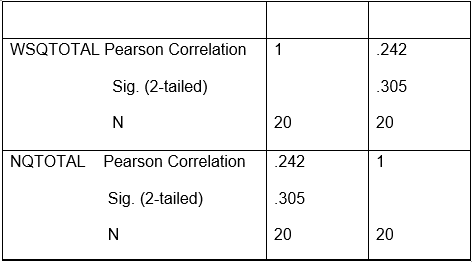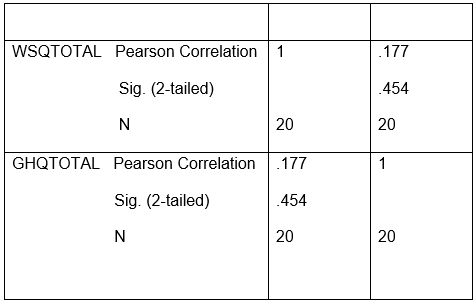Introduction
Individuals with neuroticism are often in negative emotional states characterized by frequent feelings of anxiety. Anxiety has critical influence on an individual’s psychological well-being (Coon & Mitterer, 2006). In addition, the negative emotions have direct correlations with individual personalities. On the contrary, positive emotions are critical in enhancing personal growth and fulfillment. Studies indicate that personality traits are significant in dealing with stressful events.
Available data indicates that anxiety has significant connotations for individuals’ psychological well-being. Specifically, daily experiences and stressors are the ingredients for health concerns such as anxiety. In other words, the relationship between an individual and the environment has positive impact on individuals’ well-being. Studies postulate that failure to deal effectively with traumatic conditions cause psychological concerns such as depression (Carr, 2013). Where individuals experience anxiety, greater exposure to negative psychological well-being is imminent.
Researches assert that neuroticism is associated with numerous mental disorders including anxiety as well as depression. In addition, studies have found out that neuroticism causative aspects account for over fifty percent of factors contributing to genetic variance of anxiety in individuals (Harrington, 2012). Moreover, individuals exhibiting neuroticism symptoms encounter numerous life stressors thereby increasing the risks of developing mental and psychological problems.
Sleep is critical in enhancing individuals’ health. Therefore, insufficient sleep contributes to anxiety and emotional concerns. Studies contend that teens that spend approximately half an hour less sleeping exhibit suicidal thoughts. Several researchers have theorized that sleep is an invaluable asset regarding the management of negative emotions and regulating individuals. In this regard, researchers found out that sleep interval and quality are significant in preventing emotional distractions emanating from anxiety and pain (Coon & Mitterer, 2006). Additionally, researchers argue that sleep is instrumental in enhancing individuals’ cognitive energies to perform efficiently in demanding and stressful environments. In principle, the attainment of psychological well-being and adequate sleep are directly correlated.
Considering the link between sleep and psychopathology such as anxiety, researchers postulate that sleep disturbance is a risk factor for the development of negative emotions such as anxiety disorders. In other words, people with insomnia are exposed to greater risks of developing anxiety disorders. According to American Psychiatric Association (APA), individuals exhibiting social anxiety have greater exposures to loneliness, higher negative effects as well as desperate ideation. Generally, available evidence shows that feelings of negative emotions such as anxiety are characterized by the dysfunction in cognitive and interpersonal spheres (Carr, 2013). The study sought to broaden the available literature by examining the link between neuroticism, psychological well-being and general health.
Research Question and Hypothesis
The study sought to answer the following questions
- Is there a link between sleep and anxiety?
- Is there a relationship between sleep and general mental health?
The following were the hypotheses of the study
- Hypothesis (H1): Sleep is positively related to anxiety
- Hypothesis (H0): Sleep is negatively related to anxiety
- Hypothesis (H2): Sleep is positively related to health
- Hypothesis (H0): Sleep is negatively related to health
Methods
Procedure
The first procedure in the survey was to select the study participants. In fact, the study participants were selected through the application of random sampling procedure. Besides, the participants were selected based on various factors including the ability to answer the research questions, age, specialisation, gender and nationality. In this study, the participants were students from Zayed University, Abu Dhabi campus. All the students were deemed viable for participation in the study.
However, only twenty students above nineteen years including both female and male from diverse nationalities were selected to participate in the study through a random sampling procedure. In order to obtain the research participants, the University consent was sought. In fact, the University supported researchers that protected the rights of the participants. The purpose of the research was thoroughly explained to the students particularly those who agreed to participate. Upon the explanation of the study’s purpose, selected respondents accepted to participate in the research.
The respondents answered three questionnaires that measured anxiety level against neuroticism, weekly sleep and general health. Twenty-three survey papers were provided to the participants to answer on their free time particularly during lunchtime break. However, only twenty questionnaires were completed. Three questionnaires were not completed due insufficient time. The respondents argued that the time allocated for the survey was limited. Actually, none of the participants felt that they were being forced to take part in the study.
The questionnaires
As indicated, there were three questionnaires in the research each measuring different variables in the survey. The first questionnaire contained general health questions. In fact, the general health questionnaire consisted of twenty-eight questions with four choices. The respondents were free to pick from the choices depending on the feelings of general mental health. In addition, the respondents rated the levels of their mental health through application of the choices. The general health questionnaire constituted critical part of the research since it measured the variables that were significant in human mental well being.
The second questionnaire examined anxiety level. Anxiety level questionnaire measured the intensity of nervousness. Anxiety was found to be closely related to neuroticism. In addition, stress caused by lack of sleep was the major basis of neuroticism. Besides, the questionnaire contained twenty questions that were closely related to stress. The yes and no choices method enabled the researcher to come up with factors that contributed to anxiety and related the findings with neuroticism.
The last questionnaire was about the level of sleep. In fact, the six questions with four choices measured individual level of weekly sleep. Sleep satisfaction remained critical in the reduction of mental health problems. The response choices concerning daily quantity of sleep measured the level of sleep satisfaction on an individual within the week. The researcher used the results to make conclusions on how sleep related to anxiety and neuroticism.
Results
Twenty respondents from Zayed University participated in this study. In terms of nationality, all the participants were local citizens. According to gender, seventeen of the participants were females while three were male. The study considered the participants of above nineteen years. The average ages for the participants were 22.5 years ranging from 20 to 25 years. In addition, the participants were also from different majors ranging from psychology to business. The participants majoring in business were the majority. Specifically, the business majors were estimated to be 30% of the respondents.
According to the general health questions particularly on feelings of good health, about 60% agreed that they were better than usual while 35% of the respondents felt that they were the same as usual. Only 5% of the respondents felt worse than usual. In terms of neuroticism, 53.8% agreed that they frequently felt anxious particularly over nothing while 23.1% did not feel anxious. Further, the findings indicated that about 30% of the respondents had no problems falling asleep while 50% had problems falling asleep from the third to fifth day of the week. About 15% had trouble falling asleep on the first two days of the week while only 1% had trouble with sleep the whole week.
Correlation coefficients were conducted to establish the existing relationship between sleep and anxiety as well as the connection between sleep and general health. Regarding sleep and anxiety, there was a positive correlation (WSQ = 0.1) and (NQ = 0.242). Similarly, there was a positive correlation between sleep and general health (WSQ = 0.1) while (GHQ = 0.177).


Discussions
The study was to determine the relationship existing between sleep and anxiety as well as general mental health. The results indicated positive correlation between sleep and anxiety. In addition, the outcomes indicated positive correlation between sleep and general health of individuals. Moreover, the results were in line with the hypothesis (H1) that sleep was positively related to anxiety. As such, hypothesis (H1) was accepted while null hypothesis (H0) that sleep was negatively related to anxiety was rejected. Similarly, hypothesis (H2) that sleep was positively related to general health of an individual was accepted while the null hypothesis (H0) that sleep was negatively related to the general health of an individual was rejected.
Besides, the results were in line with the findings of various studies that lack of sleep greatly causes anxiety. In other words, highly anxious people had problems with their sleeping patterns (Carr, 2013). In addition, increased anxieties have a direct effect on the well-being of an individual. The reason explained why highly anxious individuals are likely to develop mental problems such as neuroticism. From the study, it was deduced that anxiety resulting from various factors such as lack of sleep was one of the causes of neuroticism. In fact, the findings are similar to the observations made by Harrington (2012) that individuals suffering from sleep disorder were likely to develop neuroticism. Therefore, sleep, anxiety and general health of an individual are highly correlated.
Study Limitations
The research scope was limited to particular demographic group of students aged between twenty and twenty-five years within Zayed University, Abu Dhabi campus. The anticipation was that the outcome of the study would inform further research on the field. Further, the study provided a historical and modeling framework that could be applied in dealing with neuroticism, psychological well-being and sleep. Further, the study was also limited in terms of time and resources.
Conclusion
In summary, anxiety has critical influence in an individual psychological well-being. Additionally, daily experiences and stressors are the ingredients for health concerns such as anxiety. Moreover, sleep is critical in enhancing individuals’ health. As such, insufficient sleep contributes to anxiety and emotional concerns.
References
Carr, A. (2013). Positive psychology. London, UK: Routledge. Web.
Coon, D. & Mitterer, J. (2006). Introduction to psychology: Gateways to mind and behavior. Stamford, CT: Cengage Learning. Web.
Harrington, R. (2012). Stress, health and well-being. Stamford, CT: Cengage Learning. Web.